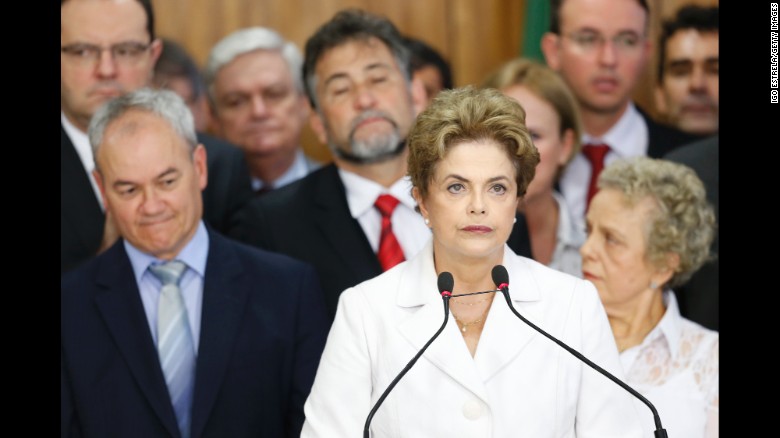President Dilma Rousseff takes stand in Brazil impeachment trial
President Dilma Rousseff insisted Monday she had committed no crime and said she was proud that she'd been "faithful to my commitment to the nation."
Brazil's post-Olympic high came to an end as Rousseff's impeachment trial began. Her remarks from the Senate floor suggested the suspended president had no intention of accepting the bid for her impeachment without a fight.
"I'll plan and fight for democracy," she said. "I don't fight for my term for the power, but I fight for the democracy for truth and justice and the people of my country."
It's not clear if an impassioned speech will do any good. The tide of opinion is against her, and the appearance is widely expected to be her last public address.
It's a jarring return to reality for the South American nation, with the final vote in the drama following the celebrations that came with Rio de Janeiro hosting the 2016 Summer Olympics.
The impeachment process has dragged on for months, predating the Olympic torch lighting ceremony -- a glitzy showpiece that, despite orchestrating, Rousseff was barred from attending. It's a political crisis that ordinary Brazilians could do well without -- the country is trying to pick itself out of recession.
'It's not an impeachment'
Rousseff calls the impeachment an attempt at a power grab by her rivals, saying her government has long been the target of political sabotage.
"When Brazil or when a president is impeached for a crime that they have not committed, the name we have for this in democracy, it's not an impeachment, it is a coup," she said in May after the Senate voted to launch the proceedings.
The heir-apparent to former President Luiz Inacio Lula da Silva, Rousseff was re-elected by a narrow margin in 2014, but soon a recession and a cross-party corruption scandal put an end to any political goodwill she might have earned.

Dilma Rousseff: This is a coup d'etat
She has been suspended from all official duties and has -- for the time being, at least -- been replaced by her former deputy, Michel Temer, a man she accuses of stabbing her in the back.
The final vote to impeach, which needs to be ratified by a two-thirds majority of 81 senators (54 votes), is expected Tuesday.
If the vote passes -- and most observers expect it to do so easily -- Temer will become the country's new president until 2018's general election, at least. He would inherit a tattered economy along with the keys to the presidential palace in Brasilia.
What do the polls say about Rousseff?
Rousseff's popularity soared when she was elected Brazil's first female President in 2010.
Lately, her approval rating has been hovering around 10%, according to recent polls.
For some context, pollster Ipsos said in a report in April that Rousseff's approval rating was around 15%, while former US President Richard Nixon's approval rating was 25% before he resigned and former US President Bill Clinton's approval rating was 65% before his impeachment.
Rousseff told CNN earlier this year that low approval ratings shouldn't fuel a push to remove a democratically elected leader from office.
What is she accused of?
She faces accusations that she doctored accounts ahead of her re-election in 2014 to hide a budget shortfall and to keep funding popular social programs. Rousseff maintains she didn't do anything illegal and is expected to counter that some of the lawmakers investigating her are under investigation for corruption.
"I have made mistakes, but I have not committed any crimes. I am being judged unjustly, because I have followed the law to the letter," Rousseff has said.
Her government has been fighting corruption allegations for a while.
A sweeping investigation into a multimillion-dollar kickback scheme at the state-run oil company Petrobras embroiled dozens of the country's leading businessmen and politicians. While she isn't accused directly of profiting, Rousseff was the chairwoman of the state oil company during many of the years of the alleged corruption.
News Courtesy: www.cnn.com











